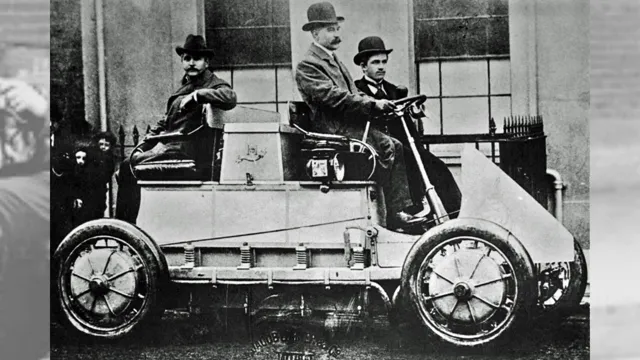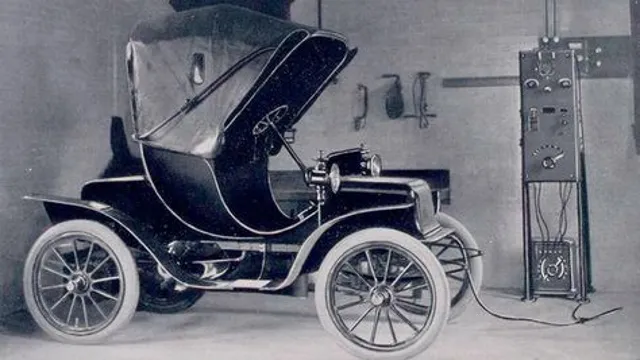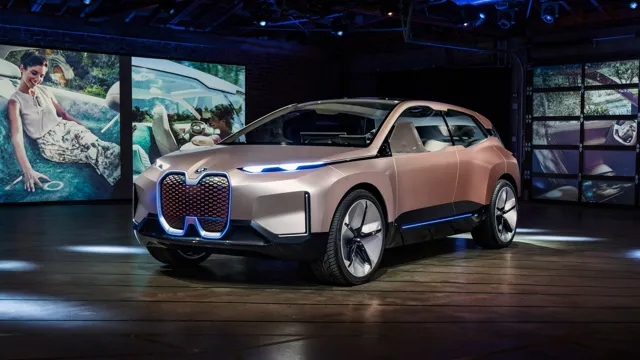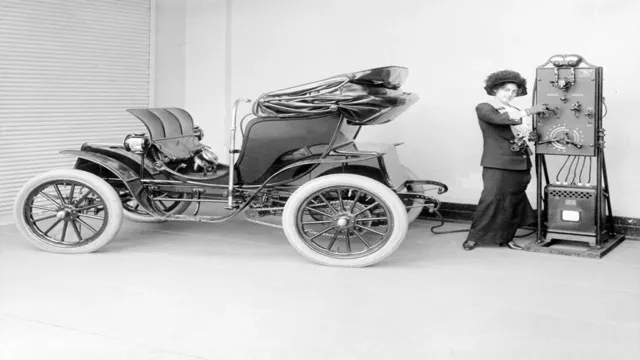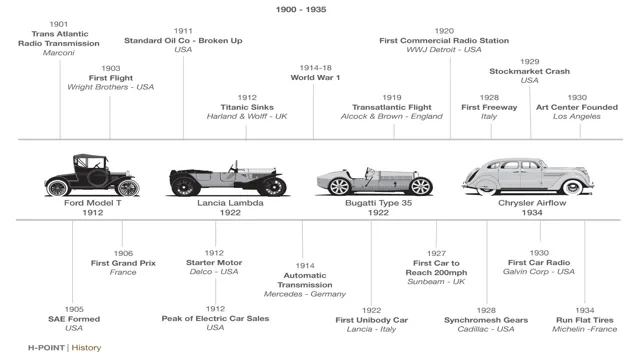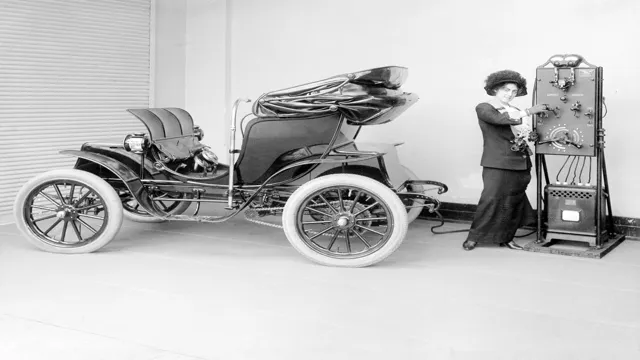Spark of Innovation: Exploring the Fascinating Early History of Electric Cars
Electric cars have become all the rage in recent years, with more and more people choosing to drive these eco-friendly vehicles as a way to reduce their carbon footprint. But have you ever wondered how the electric car came to be? It’s a fascinating story that begins over a century ago, when inventors and scientists began experimenting with ways to power vehicles without relying on fossil fuels. And while it took some time for electric cars to become mainstream, their development and evolution have truly changed the face of the automotive industry.
In this blog post, we’ll take a closer look at the birth of the electric car, exploring its history and the exciting innovations that have made it the groundbreaking technology it is today.
Early Innovations and Inventions
The early history of the electric car goes back to the 1830s, when the first small-scale electric vehicle was invented. However, it was not until the late 1800s and early 1900s that electric cars became more widely available to the public. One such innovation was the Baker Electric, which had a range of up to 100 miles and could reach speeds of up to 20 miles per hour.
These cars were popular among women drivers, as they were considered clean and easy to operate compared to gasoline-powered cars of the time. Another significant invention was the Columbia Runabout, which was the first electric car to incorporate a steering wheel instead of a tiller. These early innovations paved the way for the modern electric cars we see today, although it took some time for the technology to catch up with the demand for more efficient and sustainable transportation options.
Nonetheless, the early history of the electric car shows us that humans have been interested in electric-powered vehicles for many years, and we continue to explore ways to make them more accessible and practical for everyday use.
The Creation of the First Electric Car
The development of the first electric car was no small feat and required significant innovation and invention. In the early days of the automobile industry, many experiments and prototypes were created as inventors and manufacturers explored different power sources. One such innovator was Thomas Davenport, who in the 1830s created a small electric motor that he used to power a small model train.
Later, in the late 1800s, William Morrison and his partner built the first practical electric car. Its predecessor ran on a battery that required frequent recharging, limiting its range to just a few miles. However, this was a significant milestone in the evolution of automobiles as it paved the way for further experimentation and development into electric vehicles.
As we see today, electric cars are becoming increasingly popular as they use renewable energy and have low emissions, making them environmentally friendly.
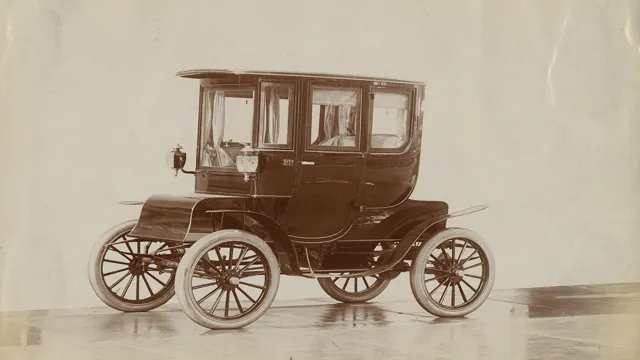
The Rise of Electric Taxis and Buses
Since the early days of the automobile industry, innovators and inventors have been experimenting with various forms of electric vehicles. While many of these early attempts failed to gain widespread popularity, the rise of electric taxis and buses in recent years has shown that the technology is finally coming into its own. These new forms of transportation offer a number of benefits over traditional gasoline-powered vehicles, including lower emissions, reduced fuel costs, and increased reliability.
In fact, electric taxis and buses are quickly becoming the go-to choice for cities and businesses looking to improve their environmental impact and save money on transportation costs. As more and more people become aware of the benefits of electric vehicles, it’s likely that these modes of transportation will continue to grow in popularity, ushering in a new era of sustainable transportation.
The Golden Age of the Electric Car
The early history of the electric car is often overlooked, but it was actually a time of great innovation and promise for the industry. During the late 1800s and early 1900s, electric vehicles were in their Golden Age. They were a popular choice for city commuters and delivery companies due to their quiet operation and lack of emissions.
They were also easier to operate than gasoline cars, as they didn’t require hand cranking to start. Companies like Baker, Columbia, and Detroit Electric were among the most successful makers of electric vehicles during this time. However, the development of cheaper and more efficient gasoline-powered vehicles eventually led to a decline in the popularity of electric cars.
It wasn’t until the 21st century that the electric car made a comeback, with new technologies making them more practical for everyday use. Nonetheless, we shouldn’t forget the impact that the early pioneers of electric vehicles had on the industry, as they set the stage for the modern electric car era.
The First Mass-Produced Electric Car Model
The first mass-produced electric car model marked the Golden Age of the electric car. While electric cars may seem like a modern invention, they have actually been around since the late 1800s. In fact, in the early 1900s, electric cars were more common than cars with gasoline engines.
The Woods Queen Victoria Brougham is widely considered to be the first mass-produced electric car model, which was introduced in 190 With a top speed of 20 mph and a range of 50 miles on a single charge, the Woods Queen quickly became the car of choice for wealthy city-dwellers. The electric car remained popular until the 1920s when gasoline cars became more affordable due to advancements in manufacturing processes.
However, as concerns about climate change and the availability of fossil fuels continue to grow, the electric car is making a comeback in the 21st century.
American and European Electric Car Competitions
As the world is moving towards a more sustainable future, electric cars have become a major focus for the automotive industry. However, the competition between American and European electric cars is intensifying, which is creating an exciting golden age for the electric car. In the American market, Tesla has become a household name for electric cars.
They have been dominating the industry with the Model S, Model X, and Model 3 which have become a status symbol for eco-conscious consumers. On the other hand, European car brands such as Volkswagen, BMW, and Mercedes have started to make a mark in the electric car market with their own electric car models. The Audi e-Tron and the Porsche Taycan are two notable European cars that compete with Tesla in terms of quality and performance.
There is no denying that the competition between American and European electric cars is driving innovation and pushing the boundaries of electric car technology. The race to create longer-lasting batteries, faster charging times, and more efficient electric motors is becoming more intense every day. The result is that eco-conscious consumers are reaping the benefits of this competition, with a wider choice of electric cars at affordable prices.
In conclusion, the golden age of the electric car is here, and the competition between American and European electric cars is fueling this revolution. With more options available than ever before, consumers have the power to choose the best electric car that fits their needs and values. The future looks bright for the electric car industry, and we can expect to see even greater innovation and competition in the years to come.
The Impact of Gasoline-Powered Cars on Electric Cars
As gasoline-powered cars have dominated roads for the past century, the electric car has struggled to find its footing. However, with advancements in technology, the electric car is now experiencing a renaissance – the golden age of the electric car. Improved battery technology and government incentives for eco-friendly vehicles have led to increased production and sales of electric cars.
Despite this progress, there are still obstacles to overcome. Range anxiety, or the fear of running out of battery power, is a major concern for potential electric car buyers. Additionally, the infrastructure for charging electric vehicles is not yet as established as gas stations.
However, as more electric cars hit the road, this problem is slowly being addressed. With the move towards sustainability and a cleaner future, it’s clear that electric cars have a significant role to play.
Decline and Resurgence of the Electric Car
The early history of the electric car is a story of decline and resurgence. The electric car actually predates gasoline-powered counterparts by several decades. In the late 19th and early 20th century, electric vehicles were popular, affordable, and practical.
They were especially favored by urban drivers who valued their quietness, cleanliness, and smooth ride. However, the rise of mass-produced gas cars, cheaper fuel, and better roads led to the decline of electric cars. By the 1920s, they had become a niche market, mostly used by delivery vans, taxis, and golf carts.
It wasn’t until the 1990s and 2000s that electric cars started making a comeback, thanks to advances in battery technology, environmental concerns, and governmental incentives. Today, electric cars are once again popular, with a growing number of models, features, and supporters. The early history of the electric car reminds us that innovation, market forces, and societal values often shape the fate of technologies, and that the future is not predetermined, but envisioned and created.
The Disappearance of Electric Cars from Public Roads
Electric Cars In the early 20th century, electric cars were relatively commonplace on public streets and highways until gasoline-powered engines became dominant. This changed partly due to technology advancements and easy accessibility to gasoline at a lower price. However, there has been a recent resurgence of electric vehicles as concerns over climate change and pollution have grown in importance.
Electric cars have several benefits over traditional gasoline-powered vehicles, including lower emissions and reduced reliance on fossil fuels. In addition, advancements in battery technology have led to longer driving ranges and faster charging times, making electric cars more practical for everyday use. Despite this resurgence, electric cars still face challenges, such as high upfront costs and limited charging infrastructure.
However, the benefits they offer may make them an appealing choice for more environmentally conscious drivers in the future.
Environmental and Efficiency Concerns Spark a Comeback
Electric Car Electric cars are not a new invention; in fact, they were first introduced in the early 19th century. However, due to the discovery of oil and the invention of the internal combustion engine, they quickly fell out of favor. Fast forward to the 21st century, and environmental and efficiency concerns have sparked a comeback.
Electric cars are seen as an alternative to traditional gasoline-powered vehicles, as they produce no emissions and lower operational costs. One of the reasons for the resurgence of electric cars is the advancements in technology, which have made them more efficient, longer-lasting, and more affordable. Governments around the world are also offering incentives and subsidies to encourage the adoption of electric cars.
The popularity of electric cars is also aided by the increasing number of charging stations, which has made it more convenient for drivers to recharge their vehicles on the go. The demand for electric cars is expected to grow rapidly in the coming years, leading to a sustainable and greener future.
The Future of Electric Cars
The early history of the electric car dates back to the late 19th century when electric vehicles were a popular and viable alternative to gasoline-powered cars. As the automotive industry developed, the main catalyst for the decline of electric cars was the invention and mass production of the internal combustion engine. Although electric cars had advantages such as lower noise and pollution levels, their limited range and the high cost of batteries made them less attractive to consumers.
However, as technology has improved, electric cars have made a dramatic comeback in recent years. With advancements in battery technology and the increasing demand for environmentally friendly transportation options, the future of electric cars is looking brighter than ever. With more affordable and efficient models expected to enter the market, it is likely that we will see an explosion in electric car ownership in the coming years.
Conclusion
In conclusion, the early history of the electric car was electrifyingly experimental, with inventors and engineers pushing the limits of technology and imagination to create a sustainable and efficient mode of transportation. From the humble beginnings of the first electric tricycles to the grand ambitions of the EV1 and Tesla Roadster, the electric car has come a long way and shows no signs of slowing down. Whether driven by eco-consciousness, economic benefit, or speed and power, the electric car has established itself as a force to be reckoned with on the roads of the future.
So let’s charge up our batteries and get ready for the next chapter in the electrifying history of the electric car!”
FAQs
What was the first electric car?
The first electric car was developed in the 1830s.
When did the electric car become popular?
Electric cars were popular in the early 1900s but lost popularity to cars with internal combustion engines.
Was there a major event that led to the decline of electric cars?
Yes, the discovery of Texas oil fields in the 1920s made gasoline more widely available and cheaper, which led to the decline of electric cars.
When did the modern electric car emerge?
The modern electric car emerged in the 1990s with the development of new batteries that extended range and performance.
How do electric cars compare to gasoline cars in terms of environmental impact?
Electric cars have lower carbon emissions than gasoline cars, but the environmental impact depends on the source of the electricity used to charge them. Using renewable energy sources like wind and solar can further decrease the environmental impact of electric cars.
